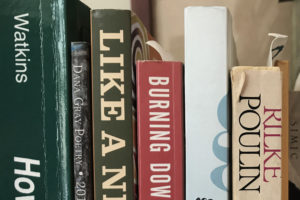Packing Up Books
When a nighthawk leaves her nest, she takes only the feathers on her back. Can you imagine?
My partner and I are packing up to move from Connecticut to California. We are bringing some furniture, some art, kitchen stuff, clothes, and about a thousand books. Probably more than a thousand.

As I pack box after box with books, a sense of their history accumulates. Signed books. Books by friends. Books still waiting to be read (many of these). Books with creased spines and marginalia. Books with inscriptions from former lovers. The Qur’an. The Bible. Books filled with Post-it notes my partner left while writing her dissertation. Print copies of periodicals with our stories in them. The program from Denis Johnson’s memorial in New York last fall. Books with coffee-stained edges. Itsy bitsy books. Giant coffee table books. I nest each book carefully into the others, minimizing air space so that they don’t shift in transit. So that when we get to California they can come out undamaged and sit again on bookshelves.
Is it right to keep these books even though some we might never open again? Keeping so many books suggests a certain confidence that there will be long lives ahead to spend reading in them. Is a big library a way of saying to death, “Not today”? We can’t, after all, take our books into the grave.
Or rather, we figuratively can’t take our books into the grave. Literally though? My friend Katharine for many years had a yippy Pomeranian named Fox. When Fox died and was to be buried, our friend Joel tore a copy of The Call of the Wild in half and placed the first half of the book in the grave with Fox’s body. Joel thought that in some metaphorical, Viking way this would grant immortal dog-life. I cringed hearing this story’s combination of biblio-destruction and naked sentimentality. At the same time, how could I not love just a little bit the idea of fluffy Fox sharing his grave with a dramatic tale of canine adventure?

Book people can be intense in their relationships with physical books. Jeff Vandermeer once visited my hometown in Northern California on the book tour for his novel Annihilation. During the tour he was busily drafting and editing Annihilation’s sequels, which were slated to come out only months later. One day he went down to Glass Beach, our old town dump which now draws tourists with its sea glass, and “in a wild, symbolic gesture” he took a printed copy of Annihilation and decided “to try to drown [it] in a tidal pool.” It refused to sink. Eventually an ever-vigilant park ranger interrupted. Vandermeer fished the floating book back out, dried it on a rock, and put a picture online. I’m not precisely sure what he was trying to accomplish here, though it makes for a vivid scene. Maybe the first book was so much in his head as he tried to draft the sequels that symbolically murdering a copy seemed like a solution.
A college girlfriend once found more success. Four years after we broke up, she published two post-mortems of our relationship, in one of which she revealed that while we were still together she developed prophetic suspicion about a book I had bought for her, a book she had picked out for me to buy her. The Woman Destroyed by Simone de Beauvoir. She felt that the book, in the context of our failing relationship, was an omen—an omen that could only be dispelled through swift disposal. Like Vandermeer, she took the book down to the beach. After attempting to burn it, she really did drown it, with no kindly park ranger arriving to intervene. She “ripped the pages to pieces, walked out into the ocean, and pushed them under a heavy mass of seaweed.” The Book Destroyed. One understands it was not the book itself that had offended her. Yet the book sufficed to take the punishment.
Books lend themselves well to metonymy and to use as ritual objects. They can stand for the author themself or for the stories they contain, for the God whose speech they record or even for the person who gave them to us. Some books are venerated, others are burned publicly—or privately drowned.
The only book I’ve ever submerged was Galapagos by Kurt Vonnegut. It fell briefly in the bath as I myself was getting out. No malice intended.

Sitting down to write about moving a library across the country—an act of delicate preservation—my thoughts keep drifting to books that never made it to their destination, books that found their end not in a reader’s imagination but in physical wreckage. Some of this is the inherent anxiety of moving. I am not a nighthawk, or at least am not a bird. My feathers are the belongings I take with me when I go. I would be sorely disappointed if I arrived to make a new home only to find some feathers missing.
And this once happened: I lost part of a library. I had just graduated from college in Boston. I had packed my books into five fat, heavy boxes. They were the chief thing I had to show for four years of study. I took the boxes by hand truck to the post office. Even at book rate, shipping them 3,000 miles cost a lot of money. I was thankful to my parents for paying this extra, unexpected expense. The books would get there in two to three weeks.
Four boxes arrived. The fifth disappeared.
I lost every poetry book I owned. Not Bishop and Crane, who had been in my carry-on. But all the rest.
For years I had taken buying poetry seriously. I was a young writer and scholar consciously building a collection. That box contained my hours sitting in Raven Books, reading, picking out which volume to take home. It contained much of the limited spending money that made me choose between books and alcohol. It was the proof that, admirably often, books had won.
For years afterwards I would find myself looking for a book only to realize that it, too, was lost. I still remember some of them, how they felt in the hand, their typesetting, certain lines of verse.
Writing this out, I try to let the details convey how upset losing that box made me. I was unaccountably upset. I felt impotent. I felt sad. I felt so frustrated I would ball my fists until the knuckles were white. My books were a part of my body. I felt like an amputee.
With the distance of years, these deep feelings of sadness seem melodramatic. Books can be purchased again when they’re needed. Or they can be borrowed from a lending library. Heck, you can even torrent them off the Internet and read them on a Kindle. It’s not ideal, or legal, or aesthetic—but neither was samizdat, where Soviet readers typed out and circulated rough copies of banned literature. Reading the books you need to read is the matter of vital importance. Tending a beautiful collection is secondary.
All the same, I pack the boxes with care. Books are my drug of choice. And we have so, so many.
 Jasper Henderson is a writer and teacher from the Mendocino Coast. His work has appeared in Joyland, Juked, 7×7, Permasummer, Your Impossible Voice, and an anthology of California writing, Golden State 2017. As a poet-teacher, he works with over four hundred students every year, from third-graders to high school seniors. He is currently pursuing an MFA in Creative Writing at Antioch University L.A. His cat is named Sybil, after the sibilant, favorite sound of cats across the galaxy.
Jasper Henderson is a writer and teacher from the Mendocino Coast. His work has appeared in Joyland, Juked, 7×7, Permasummer, Your Impossible Voice, and an anthology of California writing, Golden State 2017. As a poet-teacher, he works with over four hundred students every year, from third-graders to high school seniors. He is currently pursuing an MFA in Creative Writing at Antioch University L.A. His cat is named Sybil, after the sibilant, favorite sound of cats across the galaxy.





